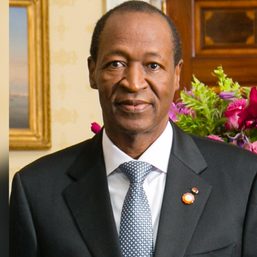SUMMARY
This is AI generated summarization, which may have errors. For context, always refer to the full article.

In 2020, an Israeli influence company orchestrated a manipulation campaign targeting the International Committee of the Red Cross (ICRC) in Burkina Faso, presumably at the request of the Burkinabe government. As part of the “Story Killers” project, Forbidden Stories and partners are revealing how the head of Percepto International, a company that advertises itself as a master “of perception,” led the campaign.
In August 2020, as the world was still reeling from the first Covid-19 wave, the French far-right magazine Valeurs Actuelles abruptly published an opinion piece that took a peculiar editorial approach. The author, Emmanuel Dupuy, questioned the motives of the International Committee of the Red Cross, a humanitarian organization whose mission is to assist victims of armed conflict, in Burkina Faso. He asked, candidly: Is the ICRC the ”godfather” and “involuntary Trojan horse of terrorism in Burkina Faso?”
According to sources, the article’s accusations relied, partly, on conversations ICRC employees allegedly had with members of armed terrorist groups to gain access to parts of the country. The author presented the ICRC’s approach as a “compromise” and said an ICRC employee had “provided food supplies to terrorists.” Circulated by the Burkinabe press, like le Faso.net and Burkinfo 24, the piece triggered a fierce anti-ICRC controversy fed by social media. “The article [provoked] violent comments online and [caused] fears for the safety of our teams in Burkina Faso,” Patrick Youssef, ICRC director for the Africa region, told Forbidden Stories.
The ICRC responded to the Valeurs Actuelles piece at the time, reiterating that “confidential dialogue remains a tried and tested tool for carrying out [its] missions on a daily basis. It is one of the main tools of an operational doctrine that has been implemented for decades.” In other words: dialogue with armed groups guarantees humanitarians can remain neutral and independent and provide humanitarian assistance
One month after Valeurs Actuelles published the piece, Peter Maurer, the ICRC president, then on tour in the region, took advantage of a press conference in Ouagadougou to recapitulate the ICRC’s role in the conflict. “We hold dialogues [with armed groups] not to please or to give any legitimacy to armed groups or to a government. We do it out of necessity, out of humanitarian need,” he said.
That day, Maurer was received by Roch Kabore, then president of Burkina Faso. Officially, the visit’s purpose was to discuss “his institution’s interventions in [the] country,” Kabore wrote on his Facebook page, along with pictures he posted of the visit. He “[saluted] the commitment of the ICRC.” On the surface, all appeared well between the presidency of Burkina Faso and the ICRC. Yet, behind closed doors, nefarious actors were orchestrating an anti-ICRC campaign.
An organized bashing campaign
In the third part of its “Story Killers” project on the business of disinformation, Forbidden Stories and partners investigated the anti-ICRC campaign. The consortium found it was led by one of two heads of an Israeli influence company, Percepto International, presumably at the Burkinabe government’s request.
On its website, Percepto International advertises itself as “the masters of perception” and offers intelligence and cyber services, among others. The company primarily sells “influence” but also positions itself as an actor engaged in the fight against disinformation. In several pieces shared on Percepto International’s blog and Medium page, employees analyze viral influence campaigns to inform the public of manipulation techniques. On its website, Percepto highlights the importance of “not underestimating the power of fake news.”
At the helm of the agency, which has customers in dozens of countries, are Royi Burstien, a former Israeli intelligence officer, and Lior Chorev, an expert in campaign management.
Retired from Israel’s Military Intelligence Directorate, where he served for 27 years, Burstien was previously general manager of Psy-Group, a pioneer influence company that shut down because of investigations into Russian interference in the 2016 US presidential election. (Burstien himself was investigated before being cleared.)
Chorev, for his part, claims to have participated in roughly 100 political campaigns on a local, national and international level, according to Percepto’s website. Among his successes, Chorev claims to have acted as a key strategist in Ariel Sharon’s campaigns for Prime Minister of Israel–which he won in 2001 and 2003; in 2006, he advised Ehud Olmert, who was also elected Prime Minister.
The anti-ICRC campaign in Burkina Faso might have gone unnoticed if Burnstien hadn’t mentioned it during a meeting with the consortium’s journalists, who posed as potential clients. In October and November 2022, reporters from Radio France, TheMarker and Haaretz attended four meetings with Burstien and Percepto employees in charge of influence, strategy and intelligence. This undercover methodology aimed to access otherwise-hidden information on the influence and disinformation market.
In one meeting, displaying a PowerPoint stamped with the company’s logo, Burstien presented a “case study” with a client referred to as “gov.” The title of the slideshow was “Limiting Prominent NGO Intervention.” “Our client had a real problem with a specific NGO that really was not objective…The question is, how do you take this NGO out of the negative ball game and put them on the sideline?” Burstien said to the journalists. (While, at the time of the anti-ICRC campaign, Percepto International did not exist as a company, and Burstein was the head of another company operating in the field, Burstien presented the case study as a significant achievement of Percepto’s.)
In the slideshow, the Valeurs Actuelles and local articles were blurred or redacted, but we managed to identify a few clues and traced the controversy’s trajectory: it started with the piece in Valeurs Actuelles that was picked up by the Burkinabe press. An AFP report then amplified the news, culminating in Kabore’s meeting with Maurer.
In response to the consortium, Patrick Youssef, ICRC director for the Africa region, said the ICRC has “regular and good interactions with the government of Burkina Faso.” Still, the likely origin of this bashing campaign, the consortium found, was the ICRC’s statements in early 2020 denouncing the arbitrary arrests and mistreatment of prisoners in the country.
Burstien told undercover journalists that Percepto chose French media to implement the campaign because “we obtained really good intelligence, and we understood that if we publish this information in local media, it won’t resonate…We worked with Tier one French media…It went viral [in Burkina Faso].” Burstien also boasted about a piece in Le Figaro, a French right-wing media outlet that repeated the AFP news report on the press conference held by Maurer in September 2020.
The firm seemed to interpret the results of the campaign as a success. “The leader of the NGO flew over to the country, has a meeting with the client, and more or less said, ‘I made a mistake, I’m backing off,’” Burstien told the undercover journalists. The example, it seems, was meant to illustrate the effectiveness of Percepto’s manipulation methods.
‘We don’t create stories‘
Questions remain as to how Burstein’s “really good intelligence” appeared in a piece in Valeurs Actuelles. “We published this text thinking it was a normal opinion piece, but it seems that it promotes an interest…and not simply an expert’s or elected official’s opinion, as is usually the case…we’ve been duped,” Geoffroy Lejeune, the magazine’s editorial director, told the consortium. The piece was an “editorial error,” he said. (The opinion piece is still available on Valeurs Actuelles’s website in its original form.)
Dupuy, the author, claims he has never heard of Percepto International. He told the consortium he was contacted by “Samuel Sellem, from the company StoryTling, who at the time was working as special advisor for presidential communication” in Burkina Faso. Dupuy said Sellem was the one who alerted him to the fact that “the ICRC could have links with armed terrorist groups,” without the headquarters “being fully aware” of it and claimed he did not receive any remuneration for the piece.
(The company did not respond to our requests for an interview.)
Dupuy accessed information about the ICRC team on the ground, according to a well-informed source, through hacked phone conversations of ICRC employees. “I had, in fact, heard of such phone taps which, presumably emanating from the Burkinabe security apparatus, were therefore authorized by the Burkinabe executive power of the time,” Dupuy said. Dupuy said he did not use the information for his piece due to their “‘secret,’ ‘closed’ and ‘questionable’ nature.”
Later, when the consortium approached Percepto, a spokesman on behalf of the company said it had no information regarding the hacked phone conversations. Regarding the anti-ICRC campaign in Burkina Faso, Chorev said the company did not participate and neither did it “create stories,” nor “approach journalists.” As for the “NGO” case study stamped with Percepto International’s logo, Chorev said it “can be a case study that is not related directly to Percepto, but just a general case study,” adding that his company uses many such examples with customers and “works strictly within legal boundaries.”
‘If one of our deep avatars engages with you, you’ll be certain that he’s a real person‘
The anti-ICRC campaign is only a sample of Percepto’s services. During the meetings with journalists, Burstien insisted on the efficacy of what he termed “unattributed campaigns,” which are impossible to link to the client or influence company.
As an example, Burstien said Percepto had created an NGO for an African government (that he did not name). Percepto allegedly controls the organization, which it uses as a vessel to promote the government’s ideas without its employees’ knowledge. Citing another case, he said Percepto invented a press agency to support a candidate in a presidential election, unbeknownst to the agency’s journalists. (Forbidden Stories could not verify these claims.)
The company also developed what it called “deep avatars,” which are “online entities that look real,” Burstien explained. “If one of our deep avatars engages with you, you’ll be certain that he’s a real person.” According to information that the consortium cross-checked with technical experts, at least two of these avatars present themselves as young women working as investigative journalists.
Chloé Boyer, the first avatar, has a blonde ponytail and wears sunglasses in her profile picture on Twitter. The second, who goes by Anita Pettit, has Twitter and Facebook accounts from which she posts media articles pertaining mostly to Africa and promotes pieces she has self-published on her blog “Pour la vérité” (“For the truth”). Pettit looks so real that she became the target of a cyberattack, after having written about Burkinabe political leaders in her blog.
Percepto International denied being behind the fake account. But in an interview, Chorev openly shared that “[their] business is to create creative tools.” Who knows where else inventiveness can bring you. – Rappler.com
This article has been republished from Forbidden Stories with permission.
Add a comment
How does this make you feel?



![[DECODED] The Philippines and Brazil have a lot in common. Online toxicity is one.](https://www.rappler.com/tachyon/2024/07/misogyny-tech-carousel-revised-decoded-july-2024.jpg?resize=257%2C257&crop_strategy=attention)



![[Rappler’s Best] US does propaganda? Of course.](https://www.rappler.com/tachyon/2024/06/US-does-propaganda-Of-course-june-17-2024.jpg?resize=257%2C257&crop=236px%2C0px%2C720px%2C720px)
There are no comments yet. Add your comment to start the conversation.